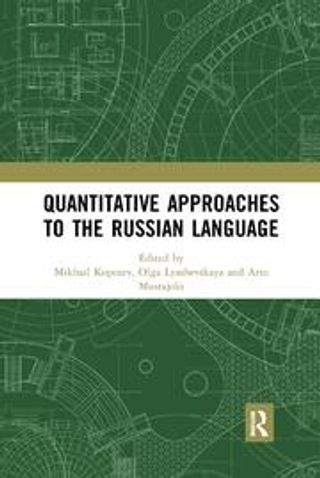?
Russian challenges for quantitative research
P. 3–29.
Ключевые слова: русский языканализ данныхкорпусная лингвистикаRussian languagecorpus linguisticsрусистикаэкспериментальная лингвистикаdata analysisExperimental Linguisticsквантитативная лингвистикаquantitative methods in linguisticsRussian linguisticsquantitative linguisticsквантитативные методы в лингвистике
Кирина М. А., Лукьянчикова А. С., В кн.: Язык в эпоху цифровых трансформаций и развития искусственного интеллекта : сб. науч. ст. по итогам II междунар. науч. конф.: Мн.: БГУИЯ, 2025. С. 74–85.
В статье рассматриваются характерные особенности гороскопических текстов как части астрологического дискурса. Материалом исследования выступает представительная выборка ежедневных предсказаний на русском языке, опубликованных в открытых группах социальной сети «ВКонтакте», суммарным объемом 1185425 словоупотреблений. С использованием методов корпусной и компьютерной лингвистики анализируются содержательные лексические единицы – как общие, так и отличительные для каждого знака зодиака (в сопоставлении ...
Добавлено: 28 февраля 2026 г.
Белова П. Е., В кн.: Актуальные вопросы лингвистики и литературоведения: сборник научных статей по материалам международной научной конференции памяти доктора филологических наук, профессора Л.А. Араевой (6–8 февраля 2025).: Кемеровский государственный университет, 2025. С. 155–160.
В данной статье содержатся результаты исследования того, как в русской языковой кар-тине мира, начиная со второй половины XX века по настоящее время, менялось восприятие площадей в пространстве города. В ходе обращения к подкорпусу художественных текстов второй половины XX века и XXI в. Национального корпуса русского языка были выявлены присущие рассматриваемому объекту когнитивные признаки, установлены предметно-понятийные ...
Добавлено: 4 февраля 2026 г.
Белова П. Е., В кн.: Когнитивные исследования языка. Вып. №1 (62): материалы Международной научной конференции по когнитивной лингвистике. 5-7 июня 2025. Ч. 2Ч. 2. Кн. 62. Вып. 1.: ТюмГУ-Press, 2025. С. 56–60.
Данная статья представляет результаты изучения содержания концепта ПРОСТРАНСТВО в русском языковом сознании на материале художественных прозаических текстов разных жанров, созданных во второй половине XX века и в XXI веке и представленных в НКРЯ. Анализ проведен с учетом таких культурно-языковых фильтров, как пропозициональные установки, предметно-понятийные корреляции и метафорические преобразования. ...
Добавлено: 4 февраля 2026 г.
Затулин К. Ф., Егоров В. Г., Докучаева А. В. и др., М.: Институт диаспоры и интеграции (Институт стран СНГ), 2025.
Книга «Правовое положение соотечественников, проживающих в постсоветских странах, в условиях нестабильной международной обстановки» содержит результаты исследования, проведенного в Абхазии, Азербайджане, Армении, Беларуси, Грузии, Казахстане, Киргизии, Латвии, Литве, Молдове, Приднестровской Молдавской Республике, Таджикистане, Узбекистане, Эстонии и Южной Осетии. Исследование выполнено Институтом диаспоры и интеграции (Институтом стран СНГ) в 2024 году. Оно включило в себя анализ нормативно-правовых ...
Добавлено: 3 февраля 2026 г.
[б.и.], 2022.
В статье освещается важность роли обучения чтению детей, ее специфические особенности и составляющие; рассмотрены основные приемы и методики, используемые при обучении чтению детей как на русском, так и на английском языках; проведена сравнительная характеристика двух языков. Кроме того, в статье также сравнивается методики обучения чтению по русскому и английскому языку для того, чтобы найти слабые ...
Добавлено: 31 января 2026 г.
Тискин Д. Б., Типология морфосинтаксических параметров 2025 Vol. 8 No. 1 P. 112–129
Добавлено: 26 января 2026 г.
Тискин Д. Б., Типология морфосинтаксических параметров 2024 Т. 7 № 1 С. 107–123
Связанные употребления индексальных выражений (fake indexicals, FI), в т. ч. личных местоимений 1 и 2 лица, анализируются И. Басси [Bassi 2021] как результат постсинтаксического процесса, обращающегося к признакам референта местоимения. Это приводит к экстравагантному описанию синтаксиса и семантики относительных придаточных, включающих FI. Опираясь на данные русского языка, мы показываем способ вернуться к более традиционному описанию ...
Добавлено: 26 января 2026 г.
Касенов Д. Е., Руднев П. В., , in: Экспериментальные исследования языка: материалы конференции 2025.: М.: Наш мир, 2025. P. 50–53.
Добавлено: 19 января 2026 г.
Бритов И. В., В кн.: Русский язык и русская культура во Вьетнаме: проблемы обучения и исследования.: Ханой: Ханойский государственный университет, 2025. С. 135–148.
В ХХI веке значительно уменьшилось количество переводов вьетнамской литературы на русский язык. Если в советский период переводами занимались профессиональные переводчики, то в настоящее время большинство переводов вьетнамских произведений на русский язык выполнено преподавателями вьетнамского языка российских вузов. Новой тенденцией также стало активное участие вьетнамских русистов в переводах с вьетнамского языка на русский. На русском языке ...
Добавлено: 18 января 2026 г.
Бритов И. В., Ханой: Ханойский государственный университет, 2025.
Без аннотации ...
Добавлено: 18 января 2026 г.
Бизяева Н. Д., Проблемы современного образования 2025 № 4 С. 134–141
Статья является результатом осмысления взглядов К. Д. Ушинского на проблему формирования национального самосознания у детей в процессе изучения родного языка. Было определено, что идея народности, выраженная в теоретических и аксиологических установках Константина Дмитриевича Ушинского, достаточно ярко была представлена в программе обучения детей «Родному слову». В ходе изучения трудов выдающегося педагогического мыслителя второй половины XIX в. ...
Добавлено: 16 декабря 2025 г.
Рахилина Е. В., Труды института русского языка им. В.В. Виноградова 2025 № 3(45) С. 296–305
Работа посвящена языковым изменениям как предсказуемым цепочкам семантических сдвигов, мотивированных как в целом, так и на отдельных этапах. Стимулом к наблюдениям над ними стал проект лингвистического комментария к повести М. Ю. Лермонтова «Фаталист», в котором исследовалась природа расхождений между нормой XIX века и современной — прежде всего, в лексике, синтаксисе и конструкциях. В ходе интерпретации ...
Добавлено: 6 декабря 2025 г.
Пермякова Т. М., Смирнова Е. А., Новые исследования Тувы 2025 № 4 С. 122–136
В статье выполнен количественный и качественный анализ терминов английского языка, связанных с изучением миграции. Источниками выступили научно-исследовательские статьи по социальным наукам, опубликованные в период с 2018 по 2020 гг. в международных журналах 1-го квартиля в наукометрической базе Scopus. Корпусно-лингвистическое исследование решает две задачи: определение функционирующих систем терминов в научных статьях, описание их дисциплинарной принадлежности по ...
Добавлено: 1 декабря 2025 г.
Рахилина Е. В., Казкенова А., Russian Language Journal 2025 Т. 75 № 1 Статья 1492
В данной статье рассматривается частный случай метафорического употребления русских глаголов движения — нестандартные метафоры движения, выявленные в текстах казахского подкорпуса Русского учебного корпуса (http://www.web-corpora.net/RLC). Тексты были написаны студентами нескольких университетов Алматы, для которых казахский язык является родным (Я1), а русский — вторым (Я2). Наше исследование фокусируется на трёх аспектах метафорического употребления глаголов движения: (1) как ...
Добавлено: 1 декабря 2025 г.
Кольцова Е. Ю., Сурков А. Ю., Procedia Computer Science 2025 Vol. 258 P. 2382–2390
Добавлено: 28 ноября 2025 г.
